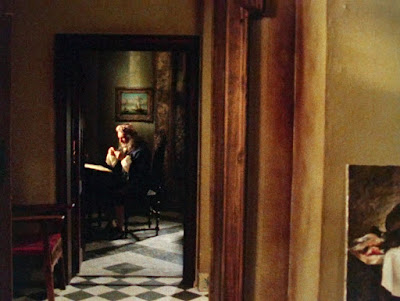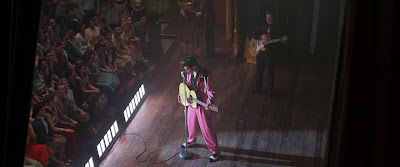Schalcken the Painter [Schalcken the Painter [Leslie Megahey, 1979]:
This is a film I first saw around four years ago. At the time I found it slightly disappointing, especially compared to some of the other BFI Flipside titles released for the same genre. I’d expected a more cinematic horror film, like later Flipside titles, Symptoms (1973) and The Appointment (1982), whereas this is very much a TV production in scale and scope.
As such, it’s limited by its exclusive use of studio interiors and lack of establishing shots, which gives the film a very stagey, hermetic quality. It also fumbles its biggest horror set piece by having lead actor Jeremy Clyde show terror in an artificial, slightly pantomimic fashion, which struck me as unintentionally amusing (and as such robbed the sequence in question of its power to shock and unnerve.)
However, a recent rewatch of the film without those earlier expectations made me appreciate it a great deal more. It’s a slow, sombre film with incredible period aesthetics and a restless nocturnal mood. The whole film feels almost suspended, as if the characters are sleepwalkers passing through a nighttime reverie; an eternal ‘dark night of the soul’, where the themes of guilt, betrayal, unrequitable desire, temptation and the certainty of death, haunt the characters like ghosts in the shadows.
Schalcken the Painter [Leslie Megahey, 1979]:
Made for the TV series ‘Omnibus,’ Megahey’s film is based on an 1839 short story by Sheridan Le Fanu, ‘Strange Event in the Life of Schalken the Painter.’ At first glance, it’s a film that feels very much akin to the kind of stylised arts docudramas pioneered by Ken Russell for the BBC. And yet, it has a tone and a subject matter much closer to the films that Lawrence Gordon Clark produced for the long running ‘A Ghost Story for Christmas’ series.
Having first aired on the BBC on the 23 December 1979, Megahey’s film is an unofficial part of the same tradition of ghost stories for Christmas, though its blending of fact and fiction, as well as its intentionally more restrained and stilted direction, gives it a very different tenor to a film like A Warning to the Curious (1972) or The Signalman (1976).
Esteemed actor Charles Gray voices Le Fanu and his dry, objective delivery helps to establish the historical basis of the film as well as the biographical backgrounds of the various characters. The film is fiction, but it maintains a tone of factual reportage, weaving figures and details from real life into the escalating horror, which gives an illusion of plausibility to the later instances of the supernatural or the unexplained.
Schalcken the Painter [Leslie Megahey, 1979]:
The period detail is exceptional, with many shots functioning as pictorial recreations or references to the Dutch masters in both design and mise-en-scene. The design of the fashionable home of Schalcken’s mentor Gerrit Dou, as well as the flat compositions and the emphasis on framing through open doorways, each recall the paintings of Johannes Vermeer, while the scenes outside the house employ the chiaroscuro lighting of Rembrandt van Rijn.
The Flipside release features in-depth interviews with writer and director Leslie Megahey (who passed away in 2022) and cinematographer John Hooper, which cover the background and production of the film. In the great BFI tradition, the release also contains two short films that explore similar themes of the Gothic and the fantastique: The Pit (1962) and The Pledge (1981)




















